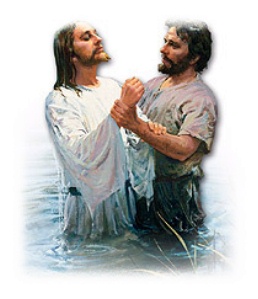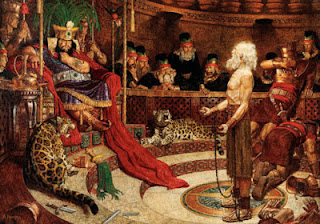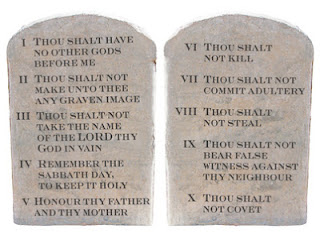Today, rather than writing as I normally do, I'd like to share my favorite biblical scripture and then expound upon it. I may use additional scriptures from the Bible, Book of Mormon, Doctrine and Covenant or Pearl of Great Price. I may expound upon some
Mormonism teachings or I may simply share personal thoughts.
My favorite scripture in the Holy Bible is found in the book of Hebrews, chapter thirteen and verse one:
"Let brotherly love continue."
Whenever I hear or speak these words what comes to mind is the question a certain lawyer in the Meridian of Time asked Jesus Christ. This experience can be found in the record of St. Matthew, chapter 22 verses 35-40:
"Then one of them, which was a lawyer, asked him a question, tempting him, and saying, Master, which is the great commandment in the law? Jesus said unto him, Thou shalt love the Lord thy God with all thy heart, and with all thy soul, and with all thy mind. This is the first and great commandment."
Why is the greatest commandment to love the Lord? Why does this take precedence above all other commands? I have spent much though on this and can give my best guess. We are told to love the Lord with "all thy heart, and with all thy soul, and with all thy mind." This is not saying, "Think of God every Sunday," or, "Pray to the Lord when you feel like it." If a person loves God as that scripture says to, then that person would not want to do anything to disappoint God. Loving someone with all our souls is a love that would do anything for them. We would never intentionally hurt someone we love that much.
If we love the Lord our God with all our hearts and soul and mind, then we will, as just mentioned, we will do our best to not disappoint or hurt the Lord. This may lead us to ask, "What would hurt the Lord?" I think this is a simple question to answer. When the children of Israel were led out of Egyptian bondage they were given commandments that he wanted them to follow. I'd imagine when the Israelites followed these commandments the Lord was very pleased. And when they did not follow these commandments I think the Lord was hurt by it. What were these commandments? Exodus chapter twenty reveals the answer:
1. Thou shalt have no other gods before me.
2. Thou shalt not make unto thee any graven image.
3. Thou shalt not take the name of the LORD thy God in vain.
4. Remember the sabbath day, to keep it holy.
5. Honour thy father and thy mother.
6. Thou shalt not kill.
7. Thou shalt not commit adultery.
8. Thou shalt not steal.
9. Thou shalt not bear false witness against thy neighbor.
10. Thou shalt not covet.
These ten things are what the Lord asked the children of Israel to follow, now referred to as the Ten Commandments. Taken one at a time, or all together, these are all things that any person who loves the Lord with all their hearts, souls and mind would do without needing to be asked.
If we love the Lord completely and thoroughly will we need or even want to worship another god? Especially a man-made one. If we do not want to worship another god would we bother making a graven image? If we do not want another god then we do not want a graven image of one. What comes next is vainly using the Lord's name. If we love God with all our hearts would we not treat his name with reverence? The Sabbath day, often called the Lord's day, is just that. Following the previous three commandments and moved with love towards him, we would want to have a day set apart for worship, to stay away from the worldly things.
The remaining commandments do not seemingly have to do with God as the previous ones do, but when looked at closer we can see that they do as well. Going back to the lawyer and Christ we read next in the record:
"And the second is like unto it, Thou shalt love thy neighbor as thyself. On these two commandments hang all the law and the prophets."
What does this second commandment have to do with the first? Why do all the law and the prophets hang upon it? And what does it have to do with the remaining ten commandments? Just as we would do our best to help out and refrain from hurting the Lord when we have a deep love for him, so we would treat our neighbors should we hold the same love for them. This is doubly so when we know that all people are God's children and therefore we should respect them as we would respect Him.
And now we get to the remaining commandments, with that knowledge in mind. Honor thy father and thy mother. Parents should be given proper respect by their children. With some unfortunate exceptions, parents have the wisdom that only comes with age and experience. A mother or father that love the Lord will raise their children to do so.
Next comes the command to not kill. I personally take this to mean someone should not kill anyone, including themselves All people are the children of God, as mentioned before. And all people have great potential. No man or woman should have the right to take away the life from another man or woman. "This life," as Alma teaches in the Book of Mormon, "is the time for men to prepare to meet God" (Alma 34:32). When a person is taken early from this preparatory life they lose that time.
God commands next to keep from committing adultery. In the Sermon on the Mount Christ expands on this by saying, "Ye have heard that it was said by them of old time, Thou shalt not commit adultery: But I say unto you, That whosoever looketh on a woman to lust after her hath committed adultery with her already in his heart." (Matthew 5:28) Thoughts lead to actions and so our thoughts must be pure as well as our actions. But if we love God, and love his children, we would show proper respect towards them, and not do these things with them.
The next two are quite similar: Theft and false witness. Theft, robbery, cheating, lying, stealing, plundering and robbery, as well as many other things, can all fall under these two great commandments. Just a couple days ago I came across the following quote by Ralph Waldo Emerson:
"Every man takes care that his neighbor shall not cheat him. But a day comes he begins to care that he does not cheat his neighbor. Then all goes well."
When we show this Christ-like love towards our neighbors we will then not want to rob or lie to them, and when they see that we do not want to do such things to them they will likely not want to do such things back to us. "Then all goes well."
We come finally to the tenth commandment: Thou shalt not covet. Most people now days would use the word 'jealousy' to explain this commandment. Refrain from jealousy. Becoming jealous of another person's possessions leads to thoughts of wanting to obtain those possessions, which then leads to the previous commandments.
How did all of this start? I go back to the very beginning of this page, to my favorite Bible scripture: Let brotherly love continue. Only four words.
Read also:
-
Short Scriptures Have Great Power
If you'd like to know more about Mormonism, the Ten Commandments, the Holy Bible, or any other gospel topic, talk to a missionary about one:
Ask Someone Here














.jpg)



